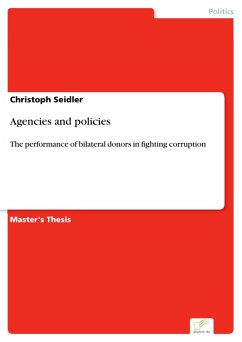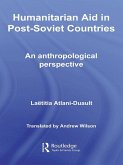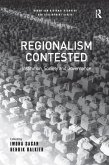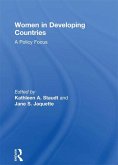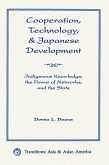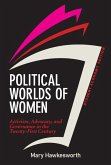Inhaltsangabe:Abstract: In this book, I want to examine how bilateral donors perform in fighting corruption. Taking an actor-centred, policy-oriented approach I focus on three selected bilateral agencies that are heavy-weights in the aid scene: the United States Agency for International Development (USAID), the British Department for International Development (DFID) and the Swedish International Development Cooperation Agency (Sida). Each of the three agencies that I focus on faces corruption individually. At the same time corruption remains a common problem, given its negative consequences on development. In this book, I take a rationalist perspective. I argue that donors perform well in fighting corruption when they cooperate. In other words: when donors try to fight corruption individually in their target countries, they risk a suboptimal outcome on the global scale - or as the Organisation for Economic Co-operation and Development (OECD) phrases it: ¿The risks associated with a piecemeal response, in which various donor organisations act in a deliberate but uncoordinated way, are set to increase.¿ Donors thus face a problem of collective action, as fragmentation of anticorruption (AC) work is often hindering success. Regime theory provides tools to overcome problems of collective action. When states establish a regime in a certain issue area, they do so to better pursue their own individual and rational interests. In the current case, it is in the bilateral donors¿ interest that their official development assistance (ODA) is used as effectively as possible. To achieve this, they need to fight corruption in their partner countries and at home in a coordinated way. Thus the question which this book addresses is: Does current cooperation between bilateral donors constitute a working international regime for fighting corruption in bilateral development cooperation? In order to answer this question, I use the following variables: the cooperation in the field of anti-corruption in bilateral development cooperation will be the independent variable, whereas the existence of a regime in this field will be the dependent variable. Other possible independent variables such as the power distribution in the international system shall be regarded as fixed. This assumption shall be permitted as the idea of a hegemonic state in a regime entirely devoted to more or less altruistic development cooperation seems to be somewhat absurd. To operationalize [...]
Dieser Download kann aus rechtlichen Gründen nur mit Rechnungsadresse in A, B, BG, CY, CZ, D, DK, EW, E, FIN, F, GR, HR, H, IRL, I, LT, L, LR, M, NL, PL, P, R, S, SLO, SK ausgeliefert werden.

